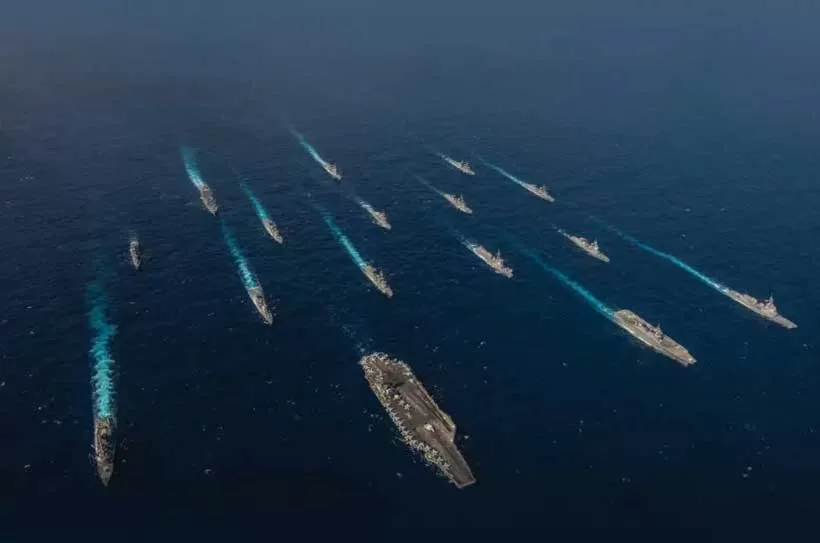The Red Sea has long been strategically important for global trade and security. The sea route that links the Indian Ocean and the Mediterranean Sea is extremely important. Recent geopolitical developments have raised concerns about the influence of Iranian-backed militias, which have been connected to several activities threatening the security and stability of the region.
Strategic, geopolitical, and security factors all came together to influence the US decision to send a special naval task force to the Red Sea. The security of this crucial waterway has come under scrutiny due to the Houthi militia’s recent actions in Yemen, which is supported by Iran. As a result, the United States has taken preventative action. The stability of the area and international shipping are directly threatened by the disruptive actions of the Houthi militia, which include drone, rocket, and missile attacks. By forming a dedicated task force, the United States aims to enhance its ability to monitor, deter, and respond to these threats, ensuring the freedom of navigation and safeguarding the interests of the international community in the Red Sea.
Furthermore, the American action is placed in the larger framework of maintaining regional security and balancing Iranian influence in the Middle East. The creation of a naval task force shows the U.S. commitment to containing destabilizing forces and halting the growth of Iranian-backed militias, given that Iran is supporting the Houthi rebels. The task force is intended to preserve a robust U.S. presence in a region where geopolitical tensions are high, in addition to being a reaction to immediate threats. Top of Form
The formation of a new U.S. naval task force to counter the threat posed by Yemen’s Houthi militia in the Red Sea, as announced by Secretary of Defense Lloyd J. Austin III, has caused diplomatic and geopolitical tremors in the area. Notably, the lack of substantial regional involvement and the hesitation of important actors highlight the precarious power dynamics and political factors at work.
Despite the strategic importance of the Red Sea for global trade, many Arab countries appear reluctant to align themselves with the United States in this military venture. The overt support for Israel’s actions in the Gaza Strip has contributed to a palpable discomfort among Arab nations, who fear being associated with a U.S.-led initiative amid widespread anger over the Israeli-Palestinian conflict.
Following the Israel-Gaza conflict, several Arab states have notably withheld their support from the creation of a special U.S. naval task force in the Red Sea. This hesitancy is explained by the perception that the United States supported Israel in the Gaza War, which inflamed animosity among the Arab populace. Arab countries are in an awkward diplomatic position as a result of the United States’ outspoken and consistent support for Israel’s military actions in Gaza.
These Arab states want to avoid being linked to a military endeavor that involves the U.S., a crucial ally, and this unease is now showing up in a lack of support for the U.S.-led initiative to counter the Houthi militia threat in the Red Sea.
The complex geopolitical landscape, exacerbated by longstanding tensions in the region, has made it challenging for Arab nations to openly collaborate with the United States in this security endeavor. Arab countries, heavily dependent on the trade routes through the Red Sea, find themselves caught between the necessity of securing maritime commerce and the political imperative of distancing themselves from U.S. initiatives that may be viewed unfavorably by their citizens. This diplomatic tightrope highlights the intricate balance Arab states must navigate to address regional security challenges without compromising their domestic and regional political standing.Top of Form
The most outspoken opponent of the US initiative is Iran, which is a major backer of the Houthi militia. Although Iran publicly denounces any coalition participation as “direct participation in the crimes of the Zionist entity,” it treads carefully by downplaying its actual involvement in Houthi attacks against Israel or Red Sea shipping. Iran’s attempts to sidestep a direct conflict with the US while continuing to back its Houthi allies are reflected in the delicate dance.
This regional hesitancy is indicative of the careful balancing act that Arab countries have to execute between the need to protect maritime trade and the political imperative of avoiding direct alignment with American initiatives that are viewed negatively by their citizens. The success and effectiveness of the U.S. naval task force in the Red Sea will depend on the complex interaction of diplomatic efforts and regional cooperation in addressing the various challenges posed by Iranian-backed militias and defending the interests of the international community as geopolitical dynamics continue to shift.
